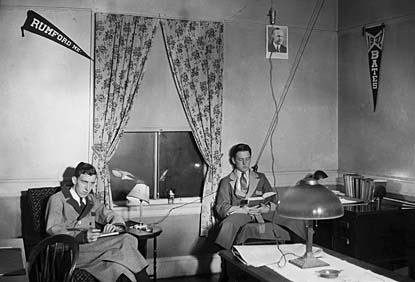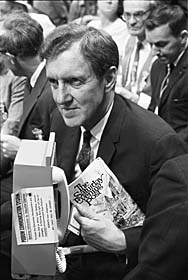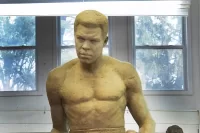
New exhibit includes rare photos of U.S. Sen. Edmund S. Muskie '36

First-year students Ed Muskie, at left, and Charles Taylor in their Bates dorm room in Roger Williams Hall, circa 1932. Below: Muskie waits to be called onstage during the Democratic National Convention in August 1968. (Photographers unknown. Photos courtesy of the Muskie Archives and Special Collections Library.)
A new photographic exhibit, including seldom-seen family images, depicting the late Maine statesman and environmentalist Edmund S. Muskie is on display at Bates College’s Edmund S. Muskie Archives and Special Collections Library, 70 Campus Ave.
From Rumford to Washington: Edmund S. Muskie’s Life in Photographs is drawn from the Edmund S. Muskie Papers at Bates, an important documentary collection relating to this Maine native and member of the Bates class of 1936 who served as a Maine governor, U.S. senator, presidential candidate and U.S. secretary of state.
The archives is open from 9 a.m. to 4 p.m. Monday through Friday. Admission is open to the public at no charge. For more information, please call 207-786-6272.
The semi-permanent exhibit coincides with the 40th anniversary of Muskie’s 1968 vice presidential campaign, when he ran with Democrat Hubert Humphrey, and with the 50th anniversary of Muskie’s election to the U.S.  Senate.
Senate.
The exhibit also marks the end of a $65,000, 15-month grant from the National Historical Publications and Records Commission. The grant enabled the archives to finish processing its Muskie holdings, including items received from the Muskie family in 2005, rendering these historic materials fully accessible to researchers for the first time.
“A lot of the Bates students who do research in the papers are able to make valuable connections between the political challenges and questions of 30 or 40 years ago and those of today,” says Muskie Papers archivist Christie Peterson, who curated the exhibit.
“I think some of them are surprised by how relevant Muskie’s career is to issues they care about personally today.”
The exhibition illustrates highlights of Muskie’s life, from his childhood in Rumford to his time at Bates, from his 1954 election as Maine’s governor to his service on the federal Tower Commission investigating the Iran-Contra affair. “There’s also a section devoted entirely to the environment, because that was the thread that ran throughout his life,” says archives director Kat Stefko.
“The exhibit draws entirely upon the Muskie papers,” says Stefko, and includes many personal photographs — including an image of the freshman student Muskie in his Bates dorm.
Much of the collection documents Muskie’s 22 years in the Senate, where his accomplishments included the landmark Clean Air Act of 1970 and Clean Water Act of 1972. Totaling some 2,350 linear feet of materials, the college’s Muskie holdings include letters and memoranda; family scrapbooks; press releases and news clippings; speeches, reports and reference materials; and audiotape, photos, film and videotape.
A companion collection at Bates is the Muskie Oral History Project, comprising 442 interviews with individuals who knew, affected or were affected by Muskie.
The grant was Bates’ first from the NHPRC, the grantmaking arm of the National Archives. It enabled Stefko’s team to finish indexing the Muskie holdings and moving them into archival storage, ensuring the longest possible life for the materials. In addition, some 800 magnetic audio recordings were stabilized and digitized, and the collection’s computerized index was updated to make it more powerful and more compatible with national databases.
“During the period of the grant,” Stefko adds, “we worked with the Muskie family to lift the restrictions on material prior to 1947, so materials about his early life are now available for scholarly research for the first time. It allows people to really get to know his biography in a way that you wouldn’t before.
“There are, for instance, all of the letters that he wrote home to his sisters when he was a student at Bates, talking about how he’s balancing his academic schedule with student government or being a waiter” in a college dining room.
“This week we had General College Elections,” the young Muskie wrote in one of those letters from Bates, this one written to his sister Lucy in March 1935. “I was fairly successful. I was reelected president of my class and, in your senior year, that is the biggest honor you can get as far as offices go. In addition to that I was elected Vice-president of the Student Council.”
More Muskie Archives news:
• Expert on vice presidency to discuss Muskie’s 1968 campaign
• Garcelon family to donate papers
– Office of Communications and Media Relations
![]()




